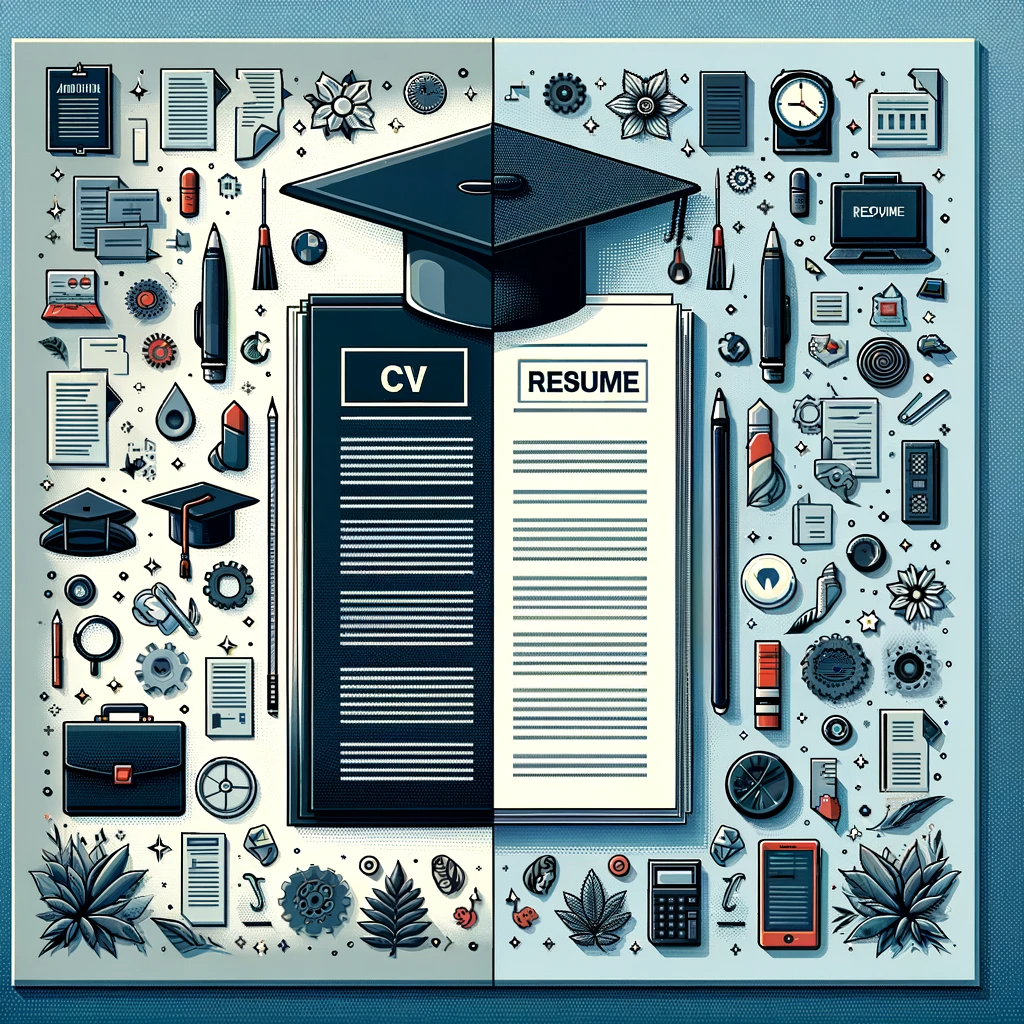Understanding the Differences Between CV and Resume
The terms “Curriculum Vitae” (CV) and “resume” are often used interchangeably, yet they represent two distinct professional documents with their own formats, lengths, and uses. Understanding the difference between these two can significantly impact your job application process, whether you’re seeking opportunities within academia, industry, or the international job market. This guide will elucidate the distinctions, helping you decide which is most appropriate for your next application.

Understanding the CV
A CV, which stands for Curriculum Vitae, Latin for “course of life,” is a detailed document highlighting an individual’s academic and professional accomplishments. Unlike the resume, a CV is comprehensive, covering education, publications, awards, and relevant work experience in depth.
Structure and Format: CVs are typically structured in chronological order, starting with the most recent achievements. They are flexible in length, often extending beyond two pages, depending on the individual’s experience and achievements.
Ideal Situations for a CV: CVs are predominantly used in academic fields, research positions, grants, and scholarship applications. They allow candidates to elaborate on their academic endeavors, research experience, and the contributions they’ve made to their field.
Understanding the Resume
A resume is a concise document aimed at showcasing an individual’s skills, experience, and education relevant to the job they are applying for. It’s designed to capture the employer’s attention quickly.
Structure and Format: Resumes are succinct, typically limited to one or two pages. They focus on brevity and relevance, highlighting experiences and skills that match the job description.
Ideal Situations for a Resume: Resumes are the go-to document for most job applications in the non-academic sector, including corporate, non-profit, and government positions. They are tailored to demonstrate how an applicant’s experiences align with the job requirements.
Key Differences Between CV and Resume
Length: CVs can run several pages, while resumes are typically one to two pages. Purpose: CVs are designed for academic or research-oriented positions, whereas resumes are tailored to a wide range of job applications in various industries. Content: CVs detail your entire career and education path, while resumes focus on relevant experiences and skills. Layout and Customization: Resumes are highly customizable to each job application, unlike CVs, which follow a more consistent structure.
When to Use a CV vs. a Resume
Academic Positions: Use a CV to apply for academic, educational, or research positions. Industry Jobs: A resume is preferable for private sector, non-profit, or government jobs. International Applications: The preference between a CV and a resume may vary by country, with CVs being more common in places like the UK and resumes in the US for non-academic positions.
How to Transition Between a CV and a Resume
Tips for Converting a CV into a Resume: Focus on condensing your information, tailoring your document to the job, and highlighting relevant skills and achievements. Tips for Expanding a Resume into a CV: Include detailed sections on your academic achievements, publications, presentations, and any other relevant professional activities.
Common Mistakes to Avoid
Avoiding common pitfalls, such as using an inappropriate document for the application or failing to tailor the document to the job, can significantly improve your chances of success.
Crafting Your CV or Resume for Success
Tailoring Your Document: Always customize your CV or resume to the job you’re applying for, emphasizing the skills and experiences that align with the job description. Highlighting Achievements: Use action verbs and quantify your achievements to demonstrate your impact. Using Keywords: Incorporate keywords from the job description to pass application tracking systems and catch the employer’s attention.

FAQs
- What is the main difference between a CV and a resume? The main difference lies in length, purpose, and layout. A CV (Curriculum Vitae) is a comprehensive document that details the entire course of your academic and professional achievements, often used for academic, research, or scholarship applications. It can extend over several pages. A resume, on the other hand, is a concise summary of your skills, education, and experience relevant to a specific job, typically limited to one or two pages, and used for job applications in the non-academic sector.
- Can I use a resume for academic applications? No, for academic applications, a CV is preferred because it provides a detailed account of your academic achievements, including education, research experience, publications, presentations, and possibly teaching experience. Academic institutions value the depth of information that a CV provides.
- How long should my resume be? A resume should ideally be one to two pages long. The goal is to provide a brief, relevant summary of your skills, experiences, and education tailored to the job you’re applying for. Keeping it concise helps maintain the employer’s attention and makes your resume more impactful.
- Do I need to include publications on my resume? Including publications on your resume is relevant if they directly relate to the job you are applying for or highlight your expertise in a specific area. For non-academic positions, you may choose to include a selection of significant publications that showcase your skills and contributions to your field. For academic positions, publications should be included in your CV, not a resume.
- How can I make my CV or resume stand out? To make your CV or resume stand out, tailor it to the job description, highlighting the experiences and skills that match what the employer is looking for. Use action verbs to describe your achievements and quantify them where possible (e.g., “increased sales by 20%”). Make sure the layout is clean and professional, and include keywords from the job posting to get past application tracking systems. Lastly, showcase your unique contributions to previous roles or projects to differentiate yourself from other candidates.
Conclusion
Understanding the difference between a CV and a resume is crucial for effectively presenting yourself to potential employers. By selecting the appropriate document, tailoring it to your audience, and highlighting your relevant skills and achievements, you can significantly increase your chances of landing your dream job. Remember, whether drafting a CV or a resume, the goal is to concisely convey your qualifications and make a compelling case for your candidacy.
🔴Do you have an ATS (Automatic tracking system) Compliant CV?
🔴Do you have a CV which is globally acceptable?
🔴Do you have professional content in your CV?
✅Get your CV designed and developed today !! Professionally .
Visit www.prosumely.com
Get your Resume reviewed for free by industry experts: Click







